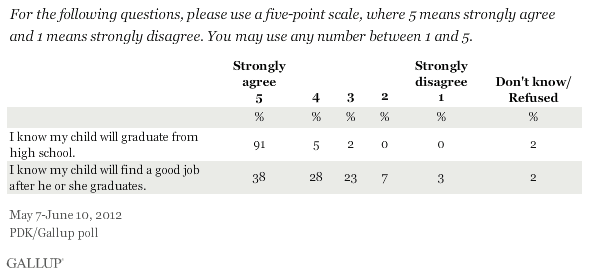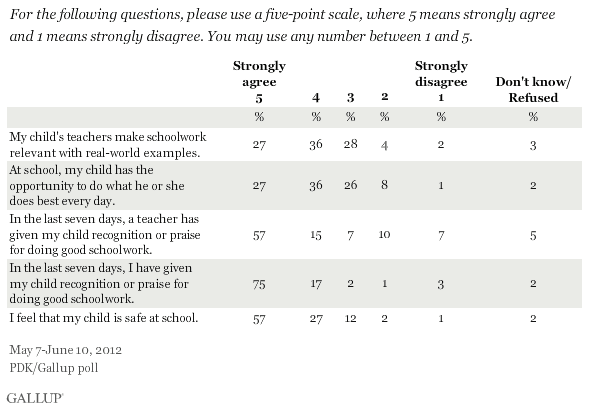WASHINGTON D.C. -- Most U.S. parents of school-aged children are confident their child will graduate from high school, but they are less sure their graduate will find a good job. More than nine in 10 parents strongly agree that their student will graduate. But far fewer, 38%, strongly agree that their child will find a good job after he or she graduates.

While parents have strong expectations their children will graduate, Education Week's reported graduation rate of (73%) indicates these expectations are not realized for many. The uncertainty parents feel about their children's prospects for finding a good job aligns with findings from the 2012 Phi Delta Kappa/Gallup poll, which show that the general U.S. population feels a lack of confidence with regard to the work readiness of high school graduates.
Previous Gallup research reveals that most U.S. students say they are not getting much practical workplace education or exposure in or out of school. In a study of U.S. students in grades 5 through 12, half agreed that their school provides classes that teach how to start and run a business, and fewer than one in four (23%) high school students worked at least one hour at any paying job the week before.
Gallup research has shown that student engagement can help improve students' school success, making them more ready for their future after graduation. In the 2012 PDK/Gallup poll, parents were asked to reflect on four factors contributing to the conditions that make student success more likely -- relevant schoolwork, having an opportunity to do what they do best, praise and recognition, and feeling safe at school.
Twenty-seven percent of parents strongly agree that their child's teachers make schoolwork relevant with real-world examples.
Another key to student engagement is allowing them to do what they do best. Twenty-seven percent of parents strongly agree that their child has an opportunity to do what they do best every day at school, leaving the rest less confident.
Praise and recognition and feeling safe are two more factors contributing to student engagement. Gallup asked parents whether their child's teacher had given them praise or recognition in the last week for doing good schoolwork. While a majority strongly agreed (57%), parents were more likely (75%) to strongly agree that they themselves had given their child praise and recognition for quality schoolwork. And nearly six in 10 (57%) parents strongly agreed that their student is safe in school.

Bottom Line
While parents are confident their children will graduate from high school, many are unsure graduation will result in a good job. This likely reflects the current level of unemployment in the country and that, for most parents, a high school education isn't enough to make their child job-ready. It may also reflect adult perceptions of the work environment generally, since eight in 10 U.S. adults say it is now a bad time to find a quality job.
But addressing factors that build student engagement -- giving them the opportunity to do what they do best, encouraging them, and providing them with safe environments -- may give students a better chance for success in school, in work, and in life.
Survey Methods
Results for this PDK/Gallup poll are based telephone interviews with 1,002 adults (including 229 parents of public school children) nationally, aged 18 and older, randomly selected from the Gallup Panel, conducted May 7-June 10, 2012. Gallup Panel members are recruited through random sampling methods. The sample included an oversample of Panel members who reported having a child aged 5 to 18 in the household. The sample is weighted to be demographically representative of the U.S. adult population and to represent the proper proportion of parents with children aged 5 to 18.
For results based on the total sample of national adults, one can say with 95% confidence that the maximum margin of sampling error is ±4 percentage points; in the case of subsamples, the margin of error is higher.
In addition to sampling error, question wording and practical difficulties in conducting surveys can introduce error or bias into the findings of public opinion polls.
For more details on Gallup's polling methodology, visit www.gallup.com.
